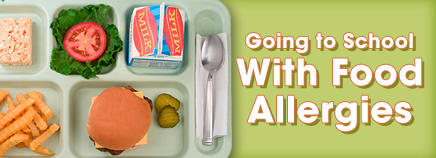
Young kids with food allergies can stay safe at school, but it takes organization, preparation, and education.
Here are tips on keeping your child safe during the school year — and all year long:
Springtime:
Now’s the time to make a summertime appointment to see your child’s allergist. And set up a meeting for the end of the summer with the school principal, the school nurse, and your child’s teacher.
Summertime:
At the allergist appointment, discuss and update the food allergy emergency plan, so that you have copies available for the school. Make sure the plan has a current photo of your child and updated contact information for you and the doctor. Check your medicine supply to make sure you have what you need to send to school. Ask the allergist for any prescriptions you need.
Order a medical alert bracelet, which can take several weeks to arrive. In addition to your child’s name and type of allergies, consider including that epinephrine should be given in case of a severe reaction and listing your emergency contact number.
At the school meeting, remind everyone that if there is a severe allergic reaction, they should give epinephrine immediately, then call 911. Make plans for different scenarios, such as snack time, lunchtime, classroom parties, and field trips.
Ask about:
- where food will be kept
- where your child will eat
- who will clean the table
- who oversees lunchtime and snack time
- who will be responsible for hand washing
- who will train substitute teachers and special-subject teachers to recognize and treat a reaction
- where epinephrine will be kept and who will be responsible for giving it, if needed
Ask the school to:
- Educate the staff about how kids describe allergic reactions (they may say food tastes spicy, their tongue feels hot, their tongue or mouth feels itchy or funny, or their lips feel tight).
- Discourage food sharing among all children.
- Encourage all kids to wash their hands with soap and water before and after eating (hand sanitizer gels do not get rid of allergens).
- Wipe down lunch tables with a disposable disinfecting wipe rather than a sponge, which could spread allergens. This should be done by an adult, not a child.
- Ask teachers not to use food as rewards in the classroom, and to give you several days’ notice of food-related events, including birthday parties.
- Look out for non-food items that could contain allergens, such as materials for art, class projects, or class pets and their food.
Back-to-School Time
Along with the pencils and backpacks, you’ll want to put together your child’s medical supplies. Double check that you have all of your child’s medicines ready to go. If possible, give the school medications that won’t expire until after the school year ends. If that’s not possible, make a note on the calendar now so you’ll be alerted before they expire and can replace them.
If your child won’t have the epinephrine auto-injector on hand at all times, be sure that it’s available in the nurse’s office, the classroom, and anywhere else your child might spend time, such as an after-school room. Label the epinephrine container with your child’s name, photo, and your emergency contact information. Also, give your child’s teacher a supply of hand wipes and safe food options for your child to use.
Write a letter to the other parents in your child’s class. Explain which allergies your child has, what this means, and how serious a reaction could be. Explain the idea of cross-contamination, and clearly state how they can help keep your child safe. Be reasonable (don’t ask for things that aren’t necessary) and be honest (don’t make things seem more serious than they are). If you can, offer to help with birthday celebrations so treats will be safe for your child.
Consider including a handout that explains how others can help those with food allergies. The Food Allergy Research and Education network (FARE) offers one.
During the School Year
- Once school starts, consider speaking at “Back to School” night or whenever you will first meet other parents. Meeting you in person can help get others to participate in keeping your child safe.
- Touch base with the teacher regularly to see how things are going. Encourage the teacher, principal, and nurse to call you with any questions that come up or to brainstorm on ways to make things safe and inclusive for your child. If there will be cooking going on, provide recipes, and possibly ingredients, to make safe foods. Consider providing bowls, spoons, and other supplies just for your child’s class so that equipment is not cross-contaminated by unsafe foods prepared by other classes.
- Let the teacher know he or she can call you anytime to check ingredients. Always review ingredients on any snacks that the school will be providing, and make sure to keep a well-stocked supply of safe foods in the classroom. Consider sending your child’s snacks and lunch from home each day in order to ensure safety.
All Year
No matter how cooperative your child’s school and teacher are, the most important preparation you can do is with your son or daughter. With time and education, your child will be able to take more responsibility for his or her safety.
- Frequently review with your child what he or she is allergic to and which foods can be eaten and which foods can’t.
- Remind your child to never accept food from anyone else in the class and never to eat something if he or she doesn’t know if it is safe. This may mean eating only foods you packed from home or you have approved.
- Teach your child to wash his or her hands before and after eating, and after playing outside.
- Review signs of an allergic reaction to watch for. And always make sure your child knows who to tell when not feeling well.

